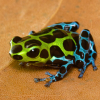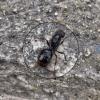Well, I'm not sure about other ants. But, I lowered my Acromyrmex versicolor colony temperature from 78-80 to 73-75 and that pretty much "fixed" my colony. That was the temperature I was keeping the closet in that they are in (with the door closed of course). Before, the fungus was turning slightly brown, very little actual white and a lot of the fungus was dying off. I thought my colony was just going to die off. Now a few days later, the fungus is VERY white (almost bright to look at), has grown a TON (in just a short time period). Almost all the fungus has already grown back, it has grown that fast.
I know some people here kept their colonies at close to 80 or more, but even 78-80 was too hot for my colony of Acromyrmex. The ants liked it, since they grew REALLY fast in colony size, in a short time period (then slowed down again when the fungus died off a lot), but the fungus definitely did not like that temperature.
Edited by Vendayn, April 6 2017 - 5:48 PM.























